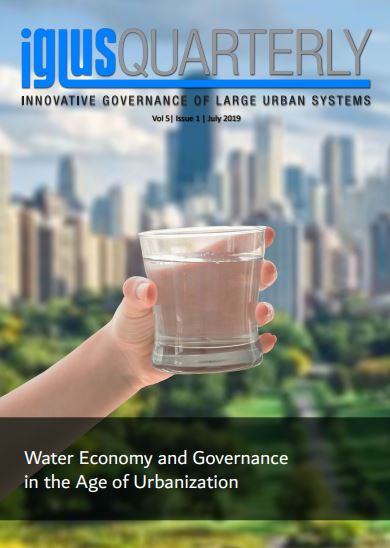Due to the severe effects of global warming, the earth is confronting various issues, including endangerment of lives. Most importantly, scarcity of water is one those issues confronted. It is not that the world does not have enough water – 70 percent of the planet is covered with water − but as we continue to fail to use available fresh water sources efficiently, we will not be even able to satisfy our survival needs. Water treatment and desalination technologies are coming to the fore, which has also made us consider water economy and the water−energy nexus. This nexus becomes especially crucial when megacities and urban areas are considered. In this issue of IGLUS Quarterly, we have tried to bring new perspectives for the water problem of urban areas and megacities by considering the water−energy nexus.
The issue opens with a short feature article that analyzes urban water management by touching upon the efficiencies of water use for domestic, industrial, agricultural,
and municipal aspects. Prof. Heechul Choi and I have tried to present a general overview on the topic.
In the second article, Dr. Moon Son adds another level to the water−energy nexus, making it the water−energy− food nexus. He offers insights into the interchangeability of water, energy, and food sources, and also provides information about membrane and electrochemical technologies and their contribution to sustainable development and megacity design. Given that 70 percent of the world is covered with seawater, desalination of sea water to provide potable water is a hot issue for countries that lack natural fresh water sources.
For a better understanding of desalination, Sung-Ho Chae and Prof. Joon Ha Kim bring an overview on the current technologies and their effect on water economy of East Asian countries such as Japan, Korea, and Singapore. The article also analyzes the water industry background of China.
The next article is about Pakistan, which is one of the world’s most water-stressed countries. However, the main issues are related to the management strategies and misuse of water sources rather than scarcity. Muhammad Saboor Siddique and Hammad Fazal present an overview of Pakistan’s water challenge by analyzing the mismanagement strategies that have resulted in water quality deterioration, ground water depletion, deforestation, deglaciation, food insecurity, and increased poverty.
In the closing article of the issue, Dr. Abayomi Babatunde Alayande and Seyi Jemima Akinlolu-Raphael discuss the failed governmental planning and policies for water crisis in Nigeria. The article addresses water issues in Nigeria related to environmental policies and the environmental and health impact of water pollution, and offers suggestions to solve these issues.
We sincerely hope that you enjoy the articles of this first issue of volume 5 of IGLUS Quarterly, and we also hope that it contributes to the awareness of the severity of water stress in the world. We invite you to join the discussion at iglus.org. If you feel that there are innovative practices underway in your city/region and you would like to contribute to an upcoming edition of IGLUS Quarterly, we encourage you to contact us at umut.tuncer@iglus.org. For inquires and questions about the content of this issue, you may also contact me at numanyanar@hotmail.com.
Numan Yanar (Editor of the Issue)
Download full pdf – IGLUS Quarterly – vol 5 – issue nr 1- year 2019




